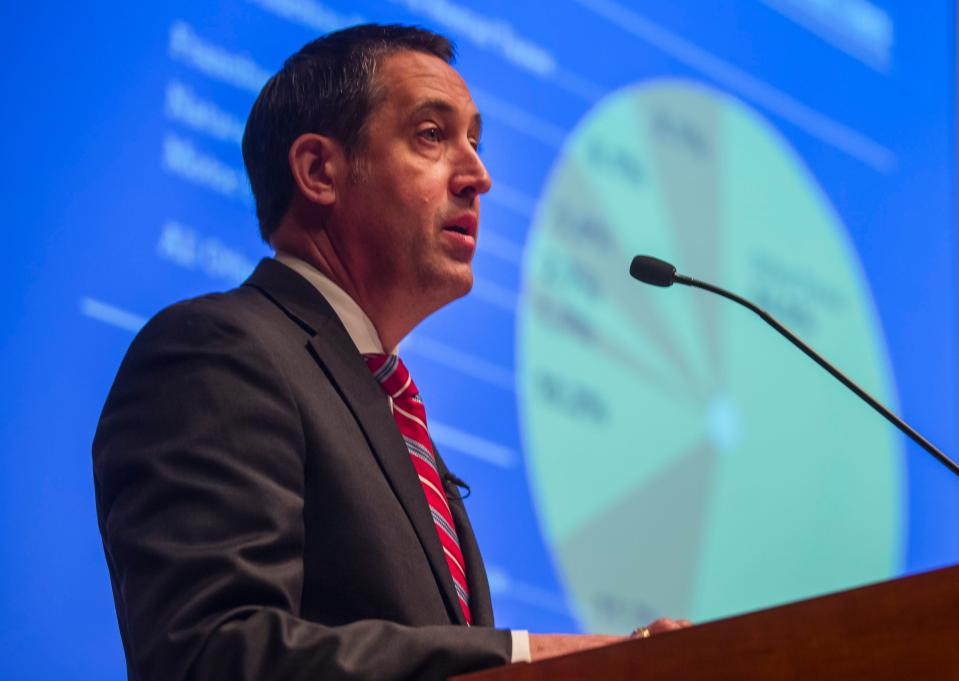Texas comptroller: As potential recession looms, state sitting on billions in tax revenue
- Oops!Something went wrong.Please try again later.
The prospect of a national recession might be looming, but the Texas economy is well-positioned to handle a downturn — and the state is sitting on billions in tax revenues heading into the upcoming legislative session.
That was the picture painted by Texas Comptroller Glenn Hegar, the state's chief financial officer, during a Wednesday economic outlook event sponsored by the Austin Chamber of Commerce.
Hegar said that when Texas lawmakers convene in January, they likely will have at least $27 billion available to allocate, which he called a once-in-a-lifetime opportunity.
"Come the day before the legislative session, one word that will stick out is 'wow,'" Hegar said during the event. "The amount of money they have at their disposal is going to be more than $27 billion. Now the priority is what to do with those dollars."

"I don't think Christmas will be like this again," he said.
Hegar said the Legislature will have the chance to invest in infrastructure and services that will fuel growth for Texas, which now has the world's ninth-largest economy.
"Infrastructure funding pays long-term dividends, whether it is road, water or grid, as well as high-speed internet broadband connectivity," he said.
Signs of trouble: New reports show Texas economy is facing headwinds
Texas 'not immune' to economic downturn
Hegar acknowledged, however, that the national and global economies are showing signs of a downturn. Texas will not be immune, he said, although he predicted it would handle a recession better than many other states.
"The economy is slowing down, and, while Texas is going to outperform the national average, ... we are not immune to the clouds on the horizon. Nobody knows how deep, how wide it will be," he said.
In terms of economic headwinds, Hegar referred to two recent reports from the Federal Reserve Bank of Dallas.
According to the Dallas Fed, the state's manufacturing output grew in October, but new orders are declining and the industry outlook is worsening.
Meanwhile, Texas retail sales declined again in October. However, activity in the Texas service sector increased at a faster pace in October, and labor market indicators suggested continued employment growth. The service sector accounts for nearly 70% of the state's economy and employs about 9.5 million workers, according to the Dallas Fed.
More:JPMorgan Chase chief Jamie Dimon bullish on Austin despite economic uncertainty
Less pain for Austin?
The manufacturing and service sectors could fare better in Austin than in other parts of Texas, however.
Austin's service sector has gotten a boost this year from some major events, including South by Southwest, Austin City Limits Music Festival and Formula One racing. Austin tourism industry leaders say they feel good about the city's prospects for the coming year.
"Some destinations are business travel destinations, some are more touristy, without as much business travel. In Austin, we get major festivals, major sporting events, leisure tourism, business travel and conventions as well," Tom Noonan, CEO of Visit Austin, the city's convention and visitors' bureau, recently told the American-Statesman.
Austin might be an exception to the slowdown in manufacturing as well, Charisse Bodisch, the chamber's senior vice president of economic development, said at the economic outlook event.
Central Texas is in a manufacturing boom, led by electric automaker Tesla, which has made Austin its headquarters. The company opened a $1.1 billion manufacturing facility in Travis County, where it is producing its Model Y electric SUVs.
In addition, tech giant Samsung is building a $17 billion semiconductor manufacturing facility in Taylor. According to documents filed with the state, Samsung is also considering building 11 chipmaking facilities in the Austin area over the next two decades, a move that could lead to nearly $200 billion in new investment and create more than 10,000 jobs for the technology giant.
"The deals we're seeing now are megadeals, billions in capital investment, once in a lifetime deals," Bodisch said.
Bodisch said that in the recession in 2008, Central Texas was one of the last regions to enter the downturn and one of the first to recover.
If history repeats itself, "I think that's going to help us this time around," she said.
The Austin metro area's unemployment rate is a sign that the local economy remains healthy, economists say. The unemployment rate fell slightly in September, putting it back below 3% for the first time in four months, according to the Texas Workforce Commission.
In addition to job growth, the Austin and Texas economies are seeing robust population growth, Hegar said. Although it's uncertain how harsh an economic downturn could be, Central Texas and the entire state are well positioned to weather it, he said.
"Every single day, another 1,000 people call Texas home," he said. "And they are moving here for economic opportunity."
This article originally appeared on Austin American-Statesman: Texas sitting on billions in tax revenue as national recession looms

